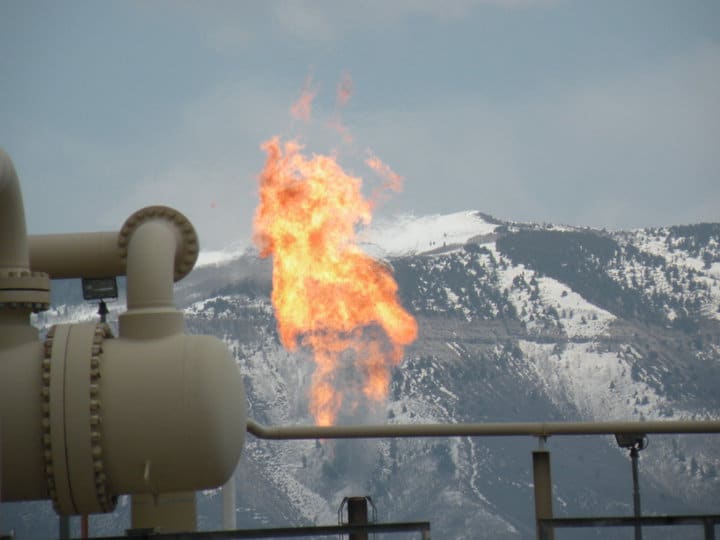A new database cataloging the world’s oil and gas reserves reveals extensive data on the global fossil fuel industry for the first time.
The Global Registry of Fossil Fuels, launched by Carbon Tracker and Global Energy Monitor, is the first public and free-to-use database of fossil fuel production, reserves, and emissions. The registry contains more than 50,000 fields across 89 countries, and it covers 75 percent of global production. The database is not only a high-level look at figures for a whole country, but it also includes data that drills down to the individual project level.
“The Global Registry will make governments and companies more accountable for their development of fossil fuels by enabling civil society to link production decisions with national climate policies,” Mark Campanale, founder of Carbon Tracker and Chair of the Registry Steering Committee, said in a statement. “Equally, it will enable banks and investors to more accurately assess the risk of particular assets becoming stranded.”
Data included in the registry suggests that simply burning through existing oil, gas, and coal reserves, would unleash more than 3.5 trillion tons of greenhouse gas emissions, amounting to more than seven times the remaining carbon budget that would keep the world beneath the Paris Agreement’s 1.5 degree Celsius (2.7 degrees Fahrenheit) warming target.
In fact, the U.S. and Russia alone have enough remaining fossil fuel reserves still in the ground that, if burned, would result in the world blowing past climate targets even if all other countries halted production.
The data stands in sharp contrast to calls from global climate scientists to wind down the extraction and production of dirty assets. Fossil fuel production must “start declining immediately and steeply to be consistent with limiting long-term warming to 1.5°C,” the UN warned in its 2021 Production Gap report.
But the buildout of fossil fuel infrastructure continues. In the U.S., for example, three large liquefied natural gas (LNG) projects are under construction, which will expand U.S. LNG export capacity by roughly a third by the mid-2020s. Natural gas production is at record levels, and crude oil production, while short of a pre-pandemic peak, continues to edge up. There is no national plan or policy to manage the necessary decline in output over time. Few countries, if any, have mapped out how to unwind their fossil fuel industries.
Other conclusions from the database launch jump out. An estimated 21 multinational companies each have projects in the works that amount to more than a billion tons of carbon dioxide equivalent (CO2e) associated with them. Qatar Energy leads the pack with 7.4 billion tons of CO2e, followed by Gazprom with 6.3 billion CO2e. The western oil majors are also in the top 10, with ExxonMobil at 3.13 billion CO2e and TotalEnergies at 2.5 billion CO2e.
In addition, the registry found that global methane emissions are having a greater impact on the global carbon math than is often thought. Methane is an extremely potent greenhouse gas, more than 80 times more powerful than CO2 over a 20-year period. However, many climate models consider methane’s impact over a 100-year period, which yields a smaller impact. The registry uses the 20-year measurement, and when that is factored into the long list of fossil fuel projects contained in the database, it leads to the conclusion that the world is burning through its carbon budget much faster than anticipated.
Global leaders are calling for dramatic change. “The fossil fuel industry is feasting on hundreds of billions of dollars in subsidies and windfall profits while household budgets shrink and our planet burns,” United Nations Secretary-General António Guterres said at the UN General Assembly on September 20. “Our world is addicted to fossil fuels. It’s time for an intervention. We need to hold fossil fuel companies and their enablers to account.”
Publication of the registry could inform policymakers around the world, shedding light on how individual oil, gas, and coal projects interact with the global carbon budget. The COP27 climate talks are scheduled to be held in November in Sharm El Sheikh, Egypt.
“We now possess a tool that can assist in effectively ending coal, oil, and gas production. The Global Registry will help governments, companies, and investors make decisions to align their fossil fuel production with the 1.5 temperature limit and, thus, concretely prevent the demise of our island homes, as well as all countries throughout our global community,” Simon Kofe, Minister of Justice, Communications & Foreign Affairs of Tuvalu, said in a statement.
Subscribe to our newsletter
Stay up to date with DeSmog news and alerts







